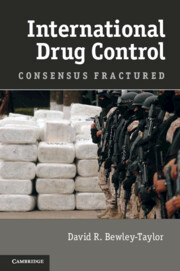Book contents
- Frontmatter
- Contents
- Figures and maps
- Tables and boxes
- Preface and acknowledgements
- Abbreviations
- 1 Introduction
- 2 Soft defection and the domestic normalization of harm reduction
- 3 Harm reduction at the UN: member state tension and systemic dissonance
- 4 Cannabis, soft defection and regime weakening
- 5 Defending the regime: the International Narcotics Control Board
- 6 Beyond regime weakening? Lessons from the UNGASS decade
- Index
- References
4 - Cannabis, soft defection and regime weakening
Published online by Cambridge University Press: 05 December 2012
- Frontmatter
- Contents
- Figures and maps
- Tables and boxes
- Preface and acknowledgements
- Abbreviations
- 1 Introduction
- 2 Soft defection and the domestic normalization of harm reduction
- 3 Harm reduction at the UN: member state tension and systemic dissonance
- 4 Cannabis, soft defection and regime weakening
- 5 Defending the regime: the International Narcotics Control Board
- 6 Beyond regime weakening? Lessons from the UNGASS decade
- Index
- References
Summary
The international community may wish to review the issue of cannabis.
INCB, Report of the International Narcotics Control Board for 2008The World Drug Report 2008, the last World Drug Report to be published before the HLS and UNGASS review, estimated that in 2006–7 there were 165.6 million cannabis users globally with annual prevalence remaining consistently high relative to other illicit drugs within most state Parties to the conventions. While use of the drug is technically prohibited in almost every nation, experimentation with or regular casual use of cannabis is a routine part of experience in many states. Although, and in many ways because, worldwide use remained high under the extant treaty framework, the years following 1998 witnessed an increasingly widespread divergence in approach between the actions of nation states and the prohibitive norm at the core of the international system. Changing attitudes towards cannabis users and the resultant policy shifts in favour of processes commonly described as ‘decriminalization’ and ‘depenalization’ provided prominent, although not exhaustive, examples of soft defection from and hence a weakening of the GDPR. After a period of relative policy stability during the 1990s, increasing numbers of Parties to the conventions began to apply alternative measures to criminal prosecution for cases concerning drug use and possession of small quantities of drugs for personal consumption. This corresponded in some ways to deviation from the regime’s prohibitive norm via growing engagement with the harm reduction approach. The functionality of interventions such as NSPs and particularly DCRs is clearly predicated upon a non-punitive response to the possession of, primarily, injectable opiates for personal use. In terms of the sheer scale of prevalence, however, varieties of cannabis use (both recreational and what was defined as medicinal) emerged as a significant point of tension between the prohibitive spirit of the conventions, including the particularly stringent controls levied on the drug within their schedules, and the less punitive policies implemented by national, and in some cases sub-national, governing authorities. In some instances, this process was part of a broader shift in national policy towards a more pragmatic health-oriented and a generally harm reductionist approach. Nonetheless, the relaxation of punitive cannabis control laws must be considered as a separate, if connected, process. After all some countries have, or are considering, the relaxation of legal responses to drug possession for personal use without actively engaging with harm reduction interventions relating to IDU.
- Type
- Chapter
- Information
- International Drug ControlConsensus Fractured, pp. 152 - 218Publisher: Cambridge University PressPrint publication year: 2012



